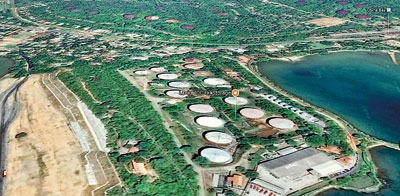News
Joint subsidiary Co. of CPC, LIOC to develop Trinco oil tanks
Cabinet approval has been granted to the Ceylon Petroleum Corporation (CPC) and the Lanka Indian Oil Co. (LIOC) to form a Joint Subsidiary Company to develop the 85 tanks at the Upper Oil Tank Farm (UOTF) in Trincomalee. Of these, 16 tanks are to be handed over later to the CPC for its exclusive use. The LIOC, meanwhile, will be given the 15 tanks it currently uses at the Lower (L)OTF, for a specific period to be determined by Cabinet.
The development comes after Cabinet approved a memorandum titled “Joint Development of UOTF in Trincomalee” submitted by Petroleum Resources Development Minister Arjuna Ranatunga.
The memorandum, seen by the Sunday Times, notes that, while 16 of the 85 tanks are to be handed over to the CPC for its exclusive use, the subsidiary Company will develop the remaining 69 tanks at the UOTF and utilize them on an agreed business model in the Petroleum industry, for a period to be determined by Cabinet.
Cabinet also approved that land ownership of the L-UOTF will be kept with the Sri Lanka State as at present.
It has been further agreed to execute a new agreement to lease out the facilities at L-UOTF to LIOC, and submit it to the Attorney General for approval, and to terminate the existing agreement signed between LIOC and the Government on February 7, 2003, with effect from the date of the aforesaid new agreement.
The Cabinet’s decision regarding the tank farms has come in for severe criticism from Petroleum sector trade unions. The move has caused particular ire, given that Cabinet had previously agreed that the CPC was capable of renovating the UOTF on its own. Ceylon Petroleum Common Workers’ Union (CPCWU) Secretary D.J. Rajakaruna told the Sunday Times that Cabinet had approved a memorandum on June 1, 2016, that 16 tanks at the farm can be renovated with all necessary facilities for US$ 10 million and that, the CPC was able to undertake this project. “Moreover, Cabinet had also acknowledged that by distributing fuel to areas surrounding Trincomalee, through China Bay, the CPC would save millions of dollars in fuel transport costs, and that, it could earn back its investment to renovate the tanks within a year,” Mr Rajakaruna added.
The CPCWU and other unions blamed Prime Minister Ranil Wickremesinghe for suspending this Cabinet memorandum and attempting to hand over the tanks to India.
Accusations which led to Unions launching an indefinite islandwide strike last year. The CPCWU Secretary said the plan had earlier been abandoned due to the trade union action. “We presented a detailed report to the President and PM during our discussions with them, highlighting how the CPC could develop the tank farm without a foreign investor. Everyone agreed with our assessment.”
Mr Rajakaruna observed that the recently approved Cabinet memorandum provides no justification as to why the CPC needed to go for a joint venture with LIOC to develop the Trincomalee OTF.
In a letter to Minister Arjuna Ranatunga, the Union expressed fears that, if LIOC were to be conferred with Legal rights to the entirety of the OTF, India could gain complete control of fuel distribution within the country, within a short period.
“You are also fully aware that the Prime Minister gave a written assurance that he would first discuss the matter with Petroleum sector unions, if the Government was going to enter into any kind of agreement with India,” the letter further noted.
While vehemently condemning the Government’s decision, the Union warned that, if remedial action was not taken urgently, they would be compelled to launch severe and indefinite trade union action.
Meanwhile, Chief Opposition Whip and Janatha Vimukthi Peramuna (JVP) Leader Anura Kumara Dissanayaka questioned in Parliament on Friday (21), as to why the Cabinet had decided to go for a joint venture with India, to develop the Trincomalee OTF, when it had earlier approved a proposal for the CPC to develop it. Neither subject Minister Arjuna Ranatunga nor Deputy Minister Anoma Gamage were present in the House to answer.
Attempts to reach Minister Ranatunga for comment proved futile.

